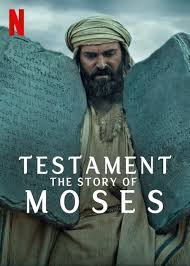
Testament: The Story of Moses S01
Director: Benjamin Ross
Cast: Charles Dance (narrator), Avi Azulay (Moses), Dominique Jade Tipper (Zipporah), Mehmet Kurtuluş (Pharaoh), Ishai Golan (Aaron), Reymonde Amsellem (Miriam), Tülay Günal (Bithiah), Melis Ulaş (Jochebed), Oberon K.A. Adjepong (Jethro), Emre Alp Törün (Dathan), Cem Emüler (Haman)
Testament: The Story of Moses is a hybrid docudrama spanning three compelling episodes, tracing Moses’s transformation from Egyptian prince to prophetic liberator. Directed by Benjamin Ross, the series merges scripted reenactment with interviews from theologians, historians, rabbis, imams, and scholars — all narrated by Charles Dance.
Avi Azulay embodies Moses with nuanced gravitas, depicting his internal struggle—from guilt over the accidental death he causes, to a reluctant acceptance of divine purpose. Alongside him, Dominique Jade Tipper plays Zipporah with warmth and empathy, while Mehmet Kurtuluş brings regal menace to Pharaoh. Supporting roles—including Ishai Golan as Aaron and Reymonde Amsellem as Miriam—add familial depth to Moses’s journey Netflix.
Visually, the series is modest in scale but thoughtful in staging—exteriors evoke ancient Egypt and Sinai’s wilderness, with intimate attention to emotional beats during pivotal scenes like the plagues and parting of the Red Sea. Commentary segments are interwoven cleanly, lending theological context without halting narrative momentum Rotten Tomatoes+15Decider+15time.com+15.
Themes of identity, doubt, redemption, covenant, and social justice are foregrounded—Moses emerges as deeply human, wrestling with inadequacy and divine mandate. The juxtapositions of spectacle (such as the Red Sea’s parting) with reflective expert commentary create a layered exploration of faith and moral struggle PureWowthereviewgeek.com.
Critical reception was mixed. Reviewers noted the docudrama’s faith-based focus and modern interpretive lens, sometimes at odds with historical fidelity. Rotten Tomatoes lists a 38% Tomatometer, while critics praised its educational framing but critiqued its visual simplicity and occasional interpretive bias. User reaction varied widely, with some viewers frustrated by what they saw as religious or cultural liberties, while others found it informative and emotionally engaging
Testament: The Story of Moses is a hybrid docudrama spanning three compelling episodes, tracing Moses’s transformation from Egyptian prince to prophetic liberator. Directed by Benjamin Ross, the series merges scripted reenactment with interviews from theologians, historians, rabbis, imams, and scholars — all narrated by Charles Dance.
Avi Azulay embodies Moses with nuanced gravitas, depicting his internal struggle—from guilt over the accidental death he causes, to a reluctant acceptance of divine purpose. Alongside him, Dominique Jade Tipper plays Zipporah with warmth and empathy, while Mehmet Kurtuluş brings regal menace to Pharaoh. Supporting roles—including Ishai Golan as Aaron and Reymonde Amsellem as Miriam—add familial depth to Moses’s journey Netflix.
Visually, the series is modest in scale but thoughtful in staging—exteriors evoke ancient Egypt and Sinai’s wilderness, with intimate attention to emotional beats during pivotal scenes like the plagues and parting of the Red Sea. Commentary segments are interwoven cleanly, lending theological context without halting narrative momentum Rotten Tomatoes+15Decider+15time.com+15.
Themes of identity, doubt, redemption, covenant, and social justice are foregrounded—Moses emerges as deeply human, wrestling with inadequacy and divine mandate. The juxtapositions of spectacle (such as the Red Sea’s parting) with reflective expert commentary create a layered exploration of faith and moral struggle PureWowthereviewgeek.com.
Critical reception was mixed. Reviewers noted the docudrama’s faith-based focus and modern interpretive lens, sometimes at odds with historical fidelity. Rotten Tomatoes lists a 38% Tomatometer, while critics praised its educational framing but critiqued its visual simplicity and occasional interpretive bias. User reaction varied widely, with some viewers frustrated by what they saw as religious or cultural liberties, while others found it informative and emotionally engaging